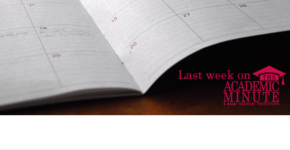
Academic Minute from 10.30 – 11.03
Monday, October 30th
Karen Kedrowski – Winthrop University
Pink Ribbons and Breast Cancer Awareness
Dr. Kedrowski has been a member of the Winthrop faculty since 1994. She received her Ph.D. from the University of Oklahoma in 1992, and her B.A. from the University of Minnesota in 1986. She is the author of Media Entrepreneurs and the Media Enterprise in the U.S. Congress (1996); coauthor of Cancer Activism (2007) and Breastfeeding Rights in the United States (2008); and author or coauthor of numerous journal articles, book chapters, and book reviews.
Kedrowski served as chair of the Political Science department from 2001 until 2013 and as dean of the College of Arts & Sciences from 2013-2017. In 2010, she was the visiting Fulbright Chair in Health, Indigenous Peoples, Media, and Education at McGill University in Montreal, Quebec.
Kedrowski has received numerous awards and honors, including the University’s Distinguished Professor Award in 2011.
Tuesday, October 31st
Tracy Betsinger – SUNY Oneonta
Vampire Legends
Dr. Tracy Betsinger is an Associate Professor SUNY Oneonta department of Anthropology. She completed her B.A. in Anthropology and Indian Studies from University of North Dakota, her B.S. in Biology from University of Wisconsin-LaCrosse, her M.A. in Anthropology from University of Tennessee, and her Ph.D. in Anthropology from the Ohio State University. Prior to joining our department, Dr. Betsinger held a post-doctoral research position with the Global History of Health Project, the Ohio State University. She joined our department in the Fall 2008 semester.
Dr. Betsinger’s research interests include bioarchaeology, paleopathology, skeletal biology, and the effects of gender, social status, and settlement patterns on health and well-being of populations. In particular, she is interested in disease, stress and deprivation, diet, and warfare and trauma. Dr. Betsinger conducts research on medieval and post-medieval populations from Poland and on prehistoric, precontact (culturally unaffiliated) populations from eastern Tennessee.
Wednesday, November 1st
Jonathan Kelber – California State University, Northridge
Pancreatic Cancer
I teach undergraduate and graduate courses on cell/molecular biology and cancer. My research focuses on understanding the mechanisms by which cancers begin and then later acquire the ability to metastasize. We also study these same mechanisms during tissue regeneration to better understand their normal contexts. By understanding what drives cancer and what prevents complete tissue regeneration, we aim to develop novels therapeutic strategies.
Thursday, November 2nd
Michelle O’Malley – University of California Santa Barbara
Biofuels
The O’Malley Lab works at the interface of engineering and biology to engineer microbes and consortia with novel functions. We are especially interested in deciphering how “unwieldy” microbes in the environment perform extraordinary tasks – many of these microbes have no available genomic sequence and are exceptionally difficult to manipulate. We seek a better understanding of how proteins are synthesized by cells, and how their three-dimensional structure informs their function would enhance our ability to engineer proteins (and cellular expression platforms) for diverse biomedical and biotechnology applications. To address these issues, our approach combines classical cell biology tools with cutting-edge technologies (genome sequencing, RNAseq, cellular reprogramming) that are rooted in the core biological sciences to interrogate and engineer molecular mechanisms that underlie protein production in eukaryotic cells. In addition, we rely on biophysical methods to elucidate protein-protein contacts, with the aim of controlling these interactions both in vivo and in vitro. Systems of interest to us have broad applicability to bioenergy and sustainability, as well as to drug development and detection.
Friday, November 3rd
John Misak – New York Institute of Technology
Storytelling in Video Games
John Misak joined NYIT in January of 2003 as a lecturer in the English department. He has since taught several courses and has worked as a tutor in the writing center for 12 years.
Misak brings his experience working as a journalist in the video game industry to his classroom through the use and discussion of technology. His courses focus on modern writing tools, like smartphones and tablets, as well as discussing how these technologies touch our lives. His research focuses on this and the use of video games as literature. He also writes mystery novels and teaches a detective fiction class where he shows students, firsthand, how such novels are researched and written.
He earned his bachelor of English at Hofstra University, his M.A. in creative writing at Queens College, and his doctorate at St. John’s University.
